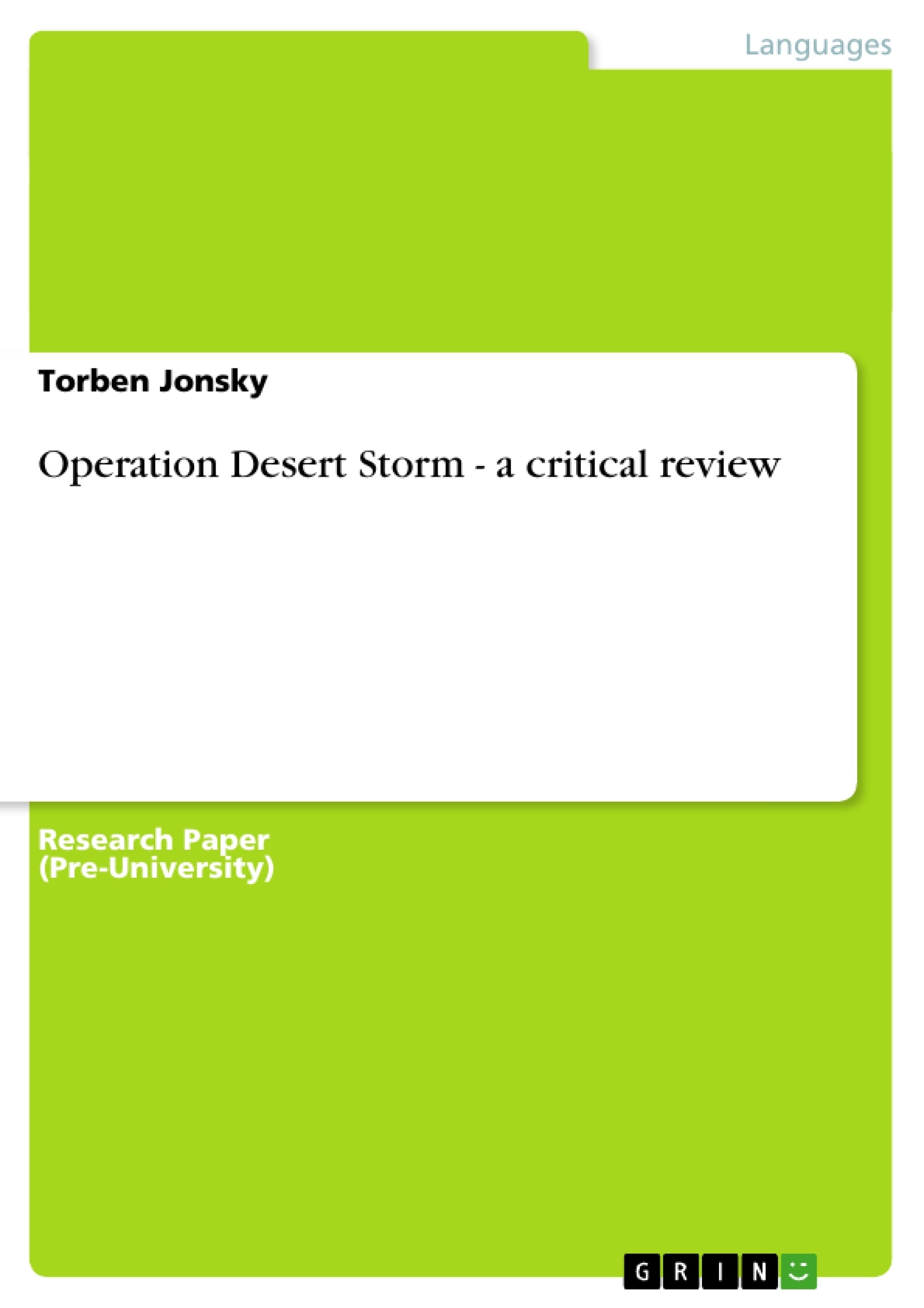This research paper is about “Operation Desert Storm.” A war which took place in 1991 between Iraq and the allied troops of the United Nations Organization (UNO) under the command of the US Army after Iraqi troops had conquered Kuwait.
The second chapter is about the war itself and the origin of the conflict between Kuwait and Iraq. It also deals with the question of why the USA intervened and includes a short summary of the development of the war. The chapters 2.2.2, 2.2.3 and 2.2.4 detail the role of the UNO, an interesting point in this war.
The third chapter is about the disinformation of the public before and during the war. This topic is still not largely known about and is also very ongoing. It contains a detailed description of the pool system and its origin. It also shows how Kuwait became popular in the USA and gives an exact view on the “Incubator Incident” in 3.3.1.
The topic about the conflict at the Gulf is still up to date, especially since resistance against the American forces in Iraq after the 3rd Gulf War is still growing today. Because of the immense size of the topic, this work shall not be a summary of the war but a work that gives an insight into certain aspects of this war, in particular the role of the UNO in the second chapter and the disinformation of the public in the third chapter.
Table of Contents
- Introduction.
- The war
- The history and the political situation of Iraq and Kuwait....
- The Second Gulf War.
- The Iraqi Army conquers Kuwait…..\li>
- The role of the UNO...
- Resolution 660
- Resolution 678: “Enforcement with all necessary means\"
- The behaviour of the UNO – a critical review
- Oil: The reason why the USA intervened?
- The development of war..
- The role of the media in the Gulf War...
- First Amendment: The freedom of the press..
- The pool system in the Gulf War...
- Vietnam, Grenada and Panama: Reasons for the pool system
- The failure of the media: The acceptance of the pool system
- How the war was made popular
- An invented story: The Incubator Incident...
- Official justification of the pool system
- The censorship in the times of the Second Gulf War - a critical review .....
- Conclusion.
Objectives and Key Themes
This research paper aims to critically examine the “Operation Desert Storm,” the 1991 war between Iraq and the United Nations (UN) forces led by the US, following Iraq's invasion of Kuwait. The paper focuses on specific aspects of the conflict, particularly the role of the UN and the public's disinformation during the war.- The historical and political context of Iraq and Kuwait leading to the conflict.
- The involvement of the UN in the Gulf War, its resolutions, and its role in authorizing military action.
- The impact of the media on public perception during the war, including the use of censorship and propaganda.
- The significance of the oil industry in the conflict, particularly the Rumailah oil field and its role in the escalation of tensions.
- The role of the US in the Gulf War and its influence on the decisions made by the UN.
Chapter Summaries
- Introduction: This chapter introduces the topic of "Operation Desert Storm" and outlines the key aspects that will be explored in the paper, including the historical background of the conflict, the role of the UN, and the media's influence on public perception.
- The War: This chapter delves into the origins of the conflict between Iraq and Kuwait, tracing its roots back to the post-World War I era. It discusses the historical and political developments leading to the Iraqi invasion of Kuwait, highlighting the role of oil resources and the influence of international powers. This chapter also explores the role of the UN, including its resolutions and the use of its power to authorize military action.
- The Role of the Media in the Gulf War: This chapter examines the media's coverage of the Gulf War, focusing on the use of censorship and propaganda. It explores the "pool system" that was implemented by the US military to control media access and information dissemination. It also analyzes the effectiveness of this system and its impact on public perception, using examples such as the "Incubator Incident" to illustrate the extent of disinformation.
Keywords
The core themes and concepts explored in this research paper include Operation Desert Storm, the Gulf War, the role of the United Nations (UN), Iraq, Kuwait, oil, media, censorship, propaganda, the pool system, disinformation, public perception, and the Incubator Incident. The paper focuses on the historical, political, and media perspectives of this conflict, examining the motivations and actions of key players, particularly the United States, Iraq, and the UN.
- Quote paper
- Torben Jonsky (Author), 2005, Operation Desert Storm - a critical review, Munich, GRIN Verlag, https://www.grin.com/document/111041




